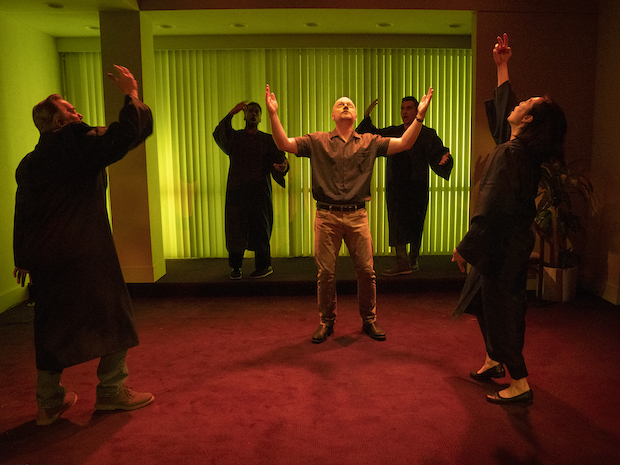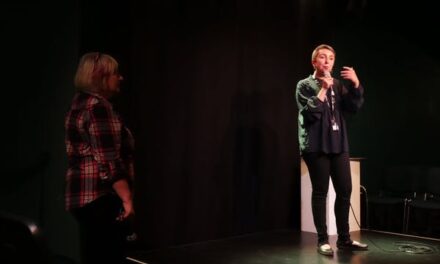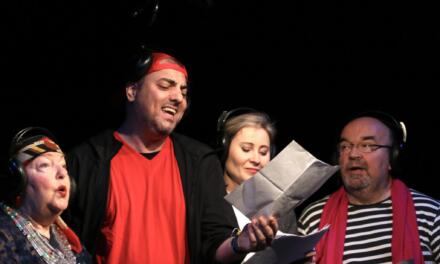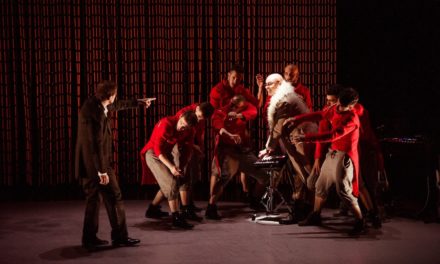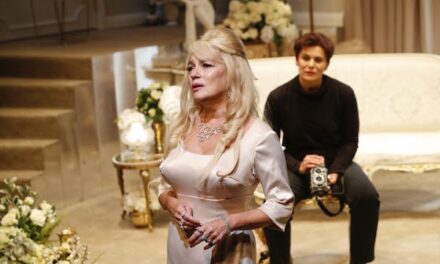The Unbelieving is documentary theater (all the lines are taken from real interviews), but this contemplative piece about clergy members who have stopped believing in God moves less like a sociology lesson, and more like a dream you struggle to hold onto as you wake up. In this piece the downtown theater group The Civilians (who are acclaimed for their investigative theater) take on Daniel C. Dennet and Linda LaScola’s 2012 book Caught in the Pulpit: Leaving Belief Behind with empathy and care.
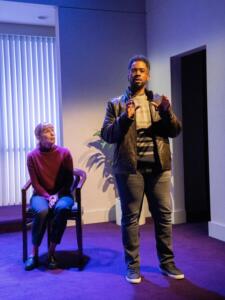
Nina Hellman and Joshua David Robinson in The Civilians’ production of THE UNBELIEVING at 59E59 Theaters – Photo by Richard Termine
Though we sometimes get only brief sketches, the various clergy members, expertly played by David Aaron Baker, Jeff Biehl, Sonnie Brown, Dan Domingues, Joshua David Robinson, and Richard Topol, are efficiently established (costume design by Emily Rebholz and shrewd direction by Steve Cosson). They are from multiple religious denominations including Evangelical Christianity, Mormonism, Orthodox Judaism, Catholicism, Islamism, Episcopal Christianity and others.
This revolving cast of characters circles through the lushly lit (lighting design by Lucrecia Briceño) but otherwise nondescript hotel room (set design by Andrew Boyce and Se Oh) and occasionally steps and sways together in synchronized motion (movement direction by Sean Donovan). This paired with Christian Frederickson’s soft, original music and sound design make the show feel almost like a dance. This is fitting for the dance many of these people find themselves in now— the dance of trying to live honestly, while holding onto their communities, and minimizing disruption in the lives of their loved ones.
Each performs this dance differently. Some decide to stay in their roles and feign belief, some leave their respective churches entirely. Richard Topol as the intellectual Orthodox man Sherm keeps his revelations secret from everyone, even his family, but performs an act of rebellion in private by shaking hands with Linda, the researcher conducting the interviews (a steady Nina Hellman)— the first time he has ever shaken hands with a woman.
Rather than an investigation into atheism, in many ways The Unbelieving illustrates the positive value of religion. The issue of whether or not a supernatural God exists aside, faith for these people, and so many others, has provided community, meaning, structure, and grounding in an often chaotic world. Now they must move forward without this God and the comfort the idea of him provided. They deal with this loss with varying levels of fear, sadness, relief, angst, and “validation” (“That’s not a feeling” replies Linda).
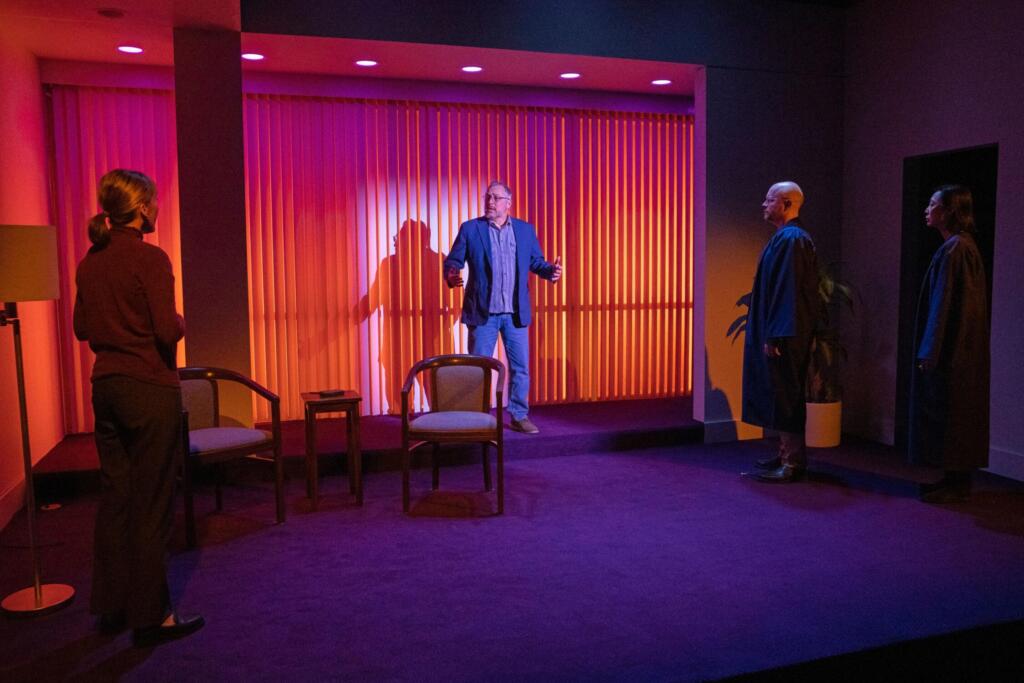
Nina Hellman, David Aaron Baker, Jeff Biehl, and Sonnie Brown in The Civilians’ production of THE UNBELIEVING at 59E59 Theaters – Photo by Richard Termine
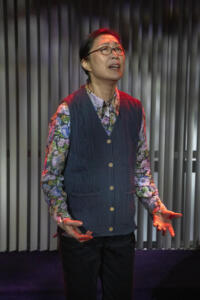
Sonnie Brown in The Civilians’ production of THE UNBELIEVING at 59E59 Theaters – Photo by Richard Termine
Marin Gazzaniga’s probing script raises questions beyond religion such as how do we make meaning for ourselves? How do we negotiate living with one another? What does it mean to live honestly when the world, and we ourselves, are complicated, full of contradictions? If spirituality is defined as an outlet for such questions then one could argue that the anonymous online forum formed for these lost clergy members functions in a way as its own sort of religion— bringing people together to search for meaning and try to live kind lives.
In her first interview Linda insists, “I’m a researcher, I have to stay objective” but these questions exist for her too. Her own stake in the project is only alluded to (original interviewee Adam has found a picture of her at an atheist conference online) but even she is perhaps forced to give up on the idea of fundamental truth. In one scene she argues with Episcopal preacher Jim (Richard Topol) who insists that religious iconography is understood by many spiritual leaders, and even taught in seminary, to be more metaphorical than hard fact. It’s the relationship with these stories not the strict belief in them that is important. But when she tries to ask why he won’t say that outright the conversation goes in circles. Much like the nonbelievers she studies, Linda’s belief in a firm truth is supplanted by a desire to mitigate harm and perhaps even do some good with her project.
Despite it being in many ways a sad show, the audience laughed a lot. As I laughed along with them I wondered if they were relating to characters like Adam (David Aaron Baker), if they too had at some point looked to God and found “he didn’t measure up.” It’s that type of show. The type that makes you think about the world around you with empathy, and tenderness, the kind that makes you appreciate and strive for connection. While small and short in staging, The Unbelieving is large in scope. I’m sure the very human stories it centers, and the metaphysical questions it raises will stick with me for some time.
This post was written by the author in their personal capacity.The opinions expressed in this article are the author’s own and do not reflect the view of The Theatre Times, their staff or collaborators.
This post was written by Morgan Skolnik.
The views expressed here belong to the author and do not necessarily reflect our views and opinions.

